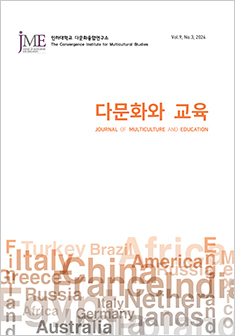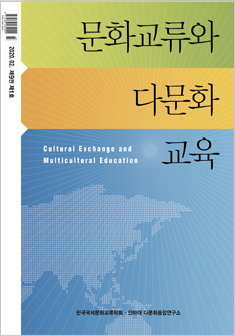
논문검색
HOME 학회지 논문검색
문화교류와 다문화교육, (2024)
pp.57~88
상호문화적 접근에 기반한 북한의 유학생용 조선어 교재 분석 : 《조선어(류학생용) 1-5》(2022, 김일성종합대학)를 중심으로
본 연구의 목적은 상호문화적 접근에 기반하여 김일성종합대학출판사에서 편찬한 유학생용 어학 교재 『조선어(류학생용) 1-5』(2022)를 분석하는 데 있다. 이를 위해 상 호문화적 접근의 원리와 외국어 교재의 관계를 살피고 현재까지 진행된 북한의 외국어 로서의 조선어 교재에 관한 연구를 검토하였다. 자료 발굴에 어려움이 따름에도 연구 가 지속되어 온 것은 귀중한 성과이나, 북한의 폐쇄성으로 인해 외부 세계와의 상호 작 용이나 상호문화성에 초점을 두고 교재를 분석한 연구는 상대적으로 부족했다고 할 수 있다. 이에 본 연구는 유럽 평의회에서 제안한 상호문화 교육의 주제와 상호문화적 절 차를 참고하여 자문화와 타 문화를 다루는 방식, 정치·사회적 관념의 표현, 교재와 학 습자의 상호 작용을 중심으로 교재의 내용을 살펴보았다. 그 결과 문화 내용 측면에서 는 북한의 발전상을 대외적으로 알리는 일에 대한 관심, 자문화의 우수성 강조, 타 문화 의 단순화 경향을 발견할 수 있었다. 정치·사회적 관념 측면에서는 사회주의 체제의 우 선, 성 역할 고정 관념, 직업군의 편중이 발견되었다. 마지막으로 교재와 학습자의 상 호 작용 측면에서는 개방적 연습 활동이 부족하다는 점, 유학생이 결핍된 존재로 묘사 된다는 점을 발견할 수 있었다. 또한 숙달도 기준에 근거하여 교재가 집필되었다는 점 과 문화 차이에 대한 이해를 강조하는 것 등을 통해 북한의 교재도 외국어 교육의 상호 문화성 추구 경향에 영향을 받고 있음을 확인하였다.
Analyzing North Korea’s Korean Language Textbooks for International Students Based on an Intercultural Approach : Focusing on “Korean Language(for International Students) 1-5” (2022, Kim Il Sung University)
The purpose of this study is to analyze the “Korean Language (for International Students) 1-5” (2022) textbook series, tailored for international learners and published by Kim Il Sung University Press, through the lens of intercultural approach. For this purpose, we examined the relationship between the principles of intercultural approach and foreign language teaching materials and reviewed the current research on Korean as a foreign language in North Korea. Despite the challenges associated with data accessibility, the scholarly efforts persist commendably. However, there exists a notable dearth of research specifically addressing engagement with external entities or intercultural dynamics, largely attributable to the seclusion of North Korea. Thus, this study undertakes a comprehensive examination of the textbook contents, focusing on their treatment of indigenous and foreign cultures, portrayal of political and societal ideologies, and interactions with learners. The analysis reveals that the textbooks prioritize the promotion of North Korean societal advancements, accentuate the superiority of indigenous culture, and oversimplify representations of other cultures. Furthermore, a discernible emphasis on socialist principles, stereotypical gender roles, and biased depictions of occupational groups is evident in the presentation of political and social concepts. Lastly, regarding learner engagement with the materials, a deficiency in open-ended practice activities is noted, alongside a depiction of international students as inadequately skilled. Moreover, the influence of an intercultural orientation in foreign language education is apparent in North Korean materials, manifested through adherence to proficiency standards and the promotion of cross-cultural understanding.
 다문화와 교육(Journal of Multiculture and Education)
다문화와 교육(Journal of Multiculture and Education) 문화교류와 다문화교육
문화교류와 다문화교육